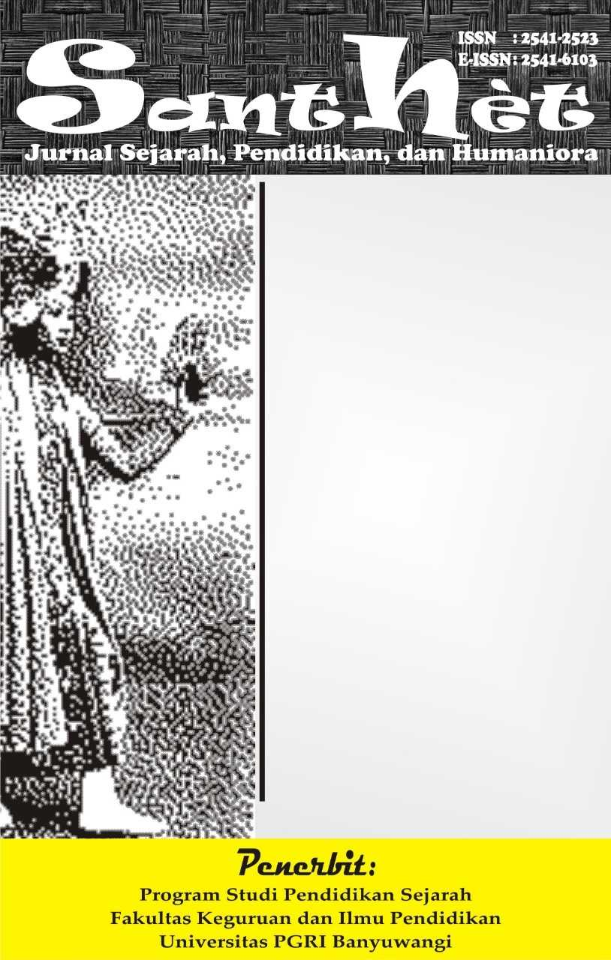COMPARISON OF THE CONCEPT OF PANCASILA DELIBERATIONS AND CONSENSUS AND HABERMAS' THEORY OF COMMUNICATIVE ACTION IN DEMOCRATIC DISCOURSE
Perbandingan Konsep Musyawarah-Mufakat Pancasila dan Teori Tindakan Komunikatif Habermas dalam Wacana Demokrasi
DOI:
https://doi.org/10.36526/santhet.v9i1.4955Keywords:
Pancasila, Democracy, Consensus Through Deliberation, Communicative Action, HabermasAbstract
Indonesia is a country whose government system is run with a democratic system. Pancasila, which is the foundation of the state, contains the principle of democracy. The main principle of the Pancasila-style democracy is deliberation to reach a consensus based on noble knowledge and wisdom. This principle of deliberation is in line with Habermas's thesis of communicative action but also has different implications. This paper compares the concept of deliberation-consensus ala Pancasila and Habermas's communicative action in implementing a democratic system. This qualitative research analyzes data that includes historical literature, philosophy, and scientific articles that discuss discourses related to Pancasila and Habermas's theory of communicative action. The study results show differences in Eastern and Western culture in the two discourses. In Pancasila deliberation and consensus, communal ties are very strong, while the value of Western individualism in rationalizing a discourse becomes the color of Habermas' theory.
References
Christensen, G. (2024). Three Concepts of Power: Foucault, Bourdieu, and Habermas. Power and Education, 16(2), 182–195. https://doi.org/10.1177/17577438231187129
Cooke, M. (2020). Private Autonomy and Public Autonomy: Tensions in Habermas’ Discourse Theory of Law and Politics. Kantian Review, 25(4), 559–582. https://doi.org/10.1017/S1369415420000412
De Angelis, G. (2021). Habermas, Democracy and the Public Sphere: Theory and Practice. European Journal of Social Theory, 24(4), 437–447. https://doi.org/10.1177/13684310211038753
Dorahy, J. F. (2022). A Subject-out-of-place: Reflections On the Recent Works On The Life and Legacies of Zygmunt Bauman. Thesis Eleven, 170(1), 136–145. https://doi.org/10.1177/07255136221103927
Forchtner, B. (2021). Critique, Habermas and Narrative (genre): The Discourse-historical Approach in Critical Discourse Studies. Critical Discourse Studies, 18(3), 314–331. https://doi.org/10.1080/17405904.2020.1803093
Habermas, J. (1984). Teori Tindakan Komunikatif. MA Beacon Press.
Habermas, J. (1991). Transformasi struktural Ruang Publik. MA The MIT Press.
Habermas, J. (2001). Teori Tindakan Komunikatif . Kabalcı Publishing House.
Habermas, J. . (2020). Tasks of critical Theory in Society. Routledge. https://doi.org/10.4324/9780429355301
Latif, Y. (2011). Negara paripurna: Historisitas, rasionalitas, dan Aktualitas Pancasila. PT Gramedia Pustaka Utama.
Mattulada. (1985). Latoa: Satu Lukisan Analitis Terhadap Antropologi Politik Orang Bugis. Gadjah Mada University Press.
Muqsith, A., Tajuddin, M. S., & Aderus, A. (2020). Negara Latoa: Tinjauan Bernegara Masyarakat Bugis dalam Lontara Latoa. Jurnal Politik Profetik, 8(1), 136–154. https://doi.org/10.24252/profetik.v8i1a6
O’Mahony, P. (2021). Habermas and the Public Sphere: Rethinking A Key Theoretical Concept. European Journal of Social Theory, 24(4), 485–506. https://doi.org/10.1177/1368431020983224
Repucci, S., & Slipowitz, A. (2021). Democracy Under Siege. Freedom House.
Smethurst, R., Young, A. G., & Wigdor, A. D. (2024). Jürgen Habermas Revisited via Tim Cook’s Wikipedia Biography: A Hermeneutic Aproach to Critical Information Systems Research. Journal of Responsible Technology, 20. https://doi.org/10.1016/j.jrt.2024.100090
Soekarno. (1965). Sebuah Otobiografi. The Bobbs-Merrill Company.
Suwarno, P. J. (1993). Pancasila Budaya Bangsa Indonesia: Penelitian Pancasila dengan Pendekatan Historis, Filosofis, dan Sosio-yuridis Kenegaraan. Penerbitan Kanisius.
Verovšek, P. J., & Burdman, J. (2024). Between Habermas and Lyotard: Rethinking the Contrast between Modernity and Postmodernity. Theory, Culture & Society, 41(3), 71–88. https://doi.org/10.1177/02632764231194483
Zakiyah, Z., Agnia, R., Handayani, H. S., Davika, Z., Ramdani, A., & Syafiq, M. Z. (2024). Diskursus Publik dan Relevansi dengan Legitimasi Kekuasaan dari Teori Habermas. Public Sphare: Jurnal Sosial Politik, 3(2).





























